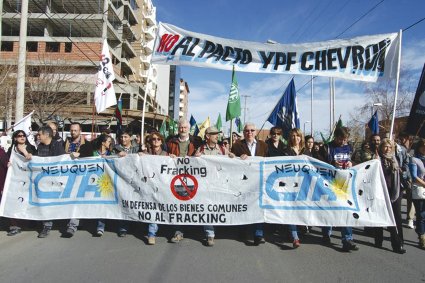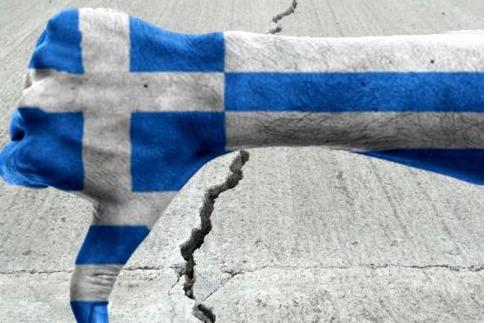Interview of Raúl Godoy. Fight for the alliance of classes that can end the regime of the oil companies
12/09/2013 Interview of Raúl Godoy, a leader of the PTS and a provincial Deputy from the Front of the Left and the Workers

One week after the vote on the agreement with Chevron and the repression in the Legislature, what is the political situation in the province?
Wednesday, August 28, was a turning point that exposed a big crisis in the province. In the first place, there is widespread repudiation of the agreement with Chevon that the MPN and the Kirchner supporters voted for in the Legislature, added to the repudiation of the brutal repression. Even what began as a rejection of the method of fracking, because of the high level of contamination, was also turned into an anti-imperialist feeling, because of the surrender of the natural resources to this US multinational corporation. The mask of "nationalists and populists" or of "progressives" fell from many politicians, because they aligned themselves completely with Chevron, and thousands saw it.
But the most important thing is that, both because of the agreement itself with Chevon and because of the way they approved it, that is, on the spur of the moment, with the Legislature cornered and under harsh repression, an enormous crisis worsened within the MPN, the governing party, that it is still difficult to know how far it could go. First was the defeat of the group of Governor Sapag in the internal election of the MPN itself, during the primary elections, against the group of the Secretary General of the Oil Workers, Guillermo Pereyra, who is also Assistant Secretary of Moyano’s CGT. He campaigned against the agreement with Chevron and unexpectedly won the governing party’s primary. And now it’s this vote at a high political cost. Governor Sapag himself came out to say, this Monday, September 2, that they are not only not thinking of being a part of the list for October, but, furthermore, they are not thinking of campaigning or voting for the candidates of their own party, something unprecedented that deepens the crisis.
What was the policy of Pereyra and the oil workers, facing the agreement with Chevron?
Pereyra campaigned, saying that he was opposing this agreement, and, with that, he got more than 110,000 votes, against 86,000 votes for Ana Pechen, the Lieutenant Governor and Sapag’s candidate. Because of that, we always said that the agreement with Chevron had already been rejected in the primary elections by 70% of the workers and people of Neuquén, because that was what we, the candidates and parties that opposed this agreement, got. But, after the elections, Pereyra literally silenced himself and, beyond the fact that his "oil worker" Deputy had cast a "symbolic" vote against, Pereyra did absolutely nothing to prevent the surrender to Chevron. If those more than 100,000 people who voted for him, were thinking that Pereyra was really going to oppose the agreement, after August 28 it was obvious to everyone that it was just talk. Because, if the Oil Workers Union decided to put that social force into motion, the thousands of workers that control the oil wells every day, the story would be different now. We, the government employees enrolled in the CTA, the teachers of ATEN, the ceramics workers, the Mapuche communities, the secondary school and university students, went on strike and mobilized on that day, resisting even the repression from the special branch of the police, for eight hours, which created a national political fact, showing an illegitimate vote, but, as we always said, the alliance with those oil workers and workers from the big industrial and service-sector unions, was necessary, and, in turn, attracting the support of broad groups of the Neuquén middle classes, that are opposed to the agreement, that is a sell-out. But Pereyra personally took charge of preventing that. Even as Assistant Secretary of Moyano’s CGT, he did not promote a single national action against this agreement, much less, a national strike. If the November 20 strike opened up an enormous crisis among supporters of Kirchner, imagine a national strike, with the Neuquén oil workers at the head.
How is the fight against Chevron going now?
As the MPN itself and the Kirchner supporters point out, this policy of surrendering the natural resources, through the "national and popular" YPF, begins with Chevron, but does not end here; this is only the beginning. Now they are talking about bringing in the Mexican PEMEX and Chinese investors, among others. That is, the MPN, associated with Kirchner’s followers, is thinking of deepening its alliance with the oil companies; they have tied their destiny to business and to the completely destructive plundering of the non-conventional [methods of oil production, i.e., fracking]. But this strategic alliance already means a high political cost for them, at the point of having lost an election and being without a candidate for October, calling for not voting for their own party. But this is only the visible part of a completely new crisis of the MPN with its historic base, the magnitude of which still remains to be seen.
In this context, an enormous challenge is posed for those of us who oppose this agreement from a workers’ perspective. Because now, it is not only the state employees’ unions, that were historically opposed to the MPN, like the CTA or ATEN, the ceramics workers or the student movement, that were the ones who actively demonstrated at the doors of the Legislature, those who reject this policy of Sapag’s government, but a break-up of its historic base and a strategic group like the oil workers, has begun. In October, Pereyra will go on the ballot of the MPN, but this breakdown is already a fact. And Sapag, without a possible re-election, has no alternative succession in sight.
For that reason, it is essential, from the workers’ and students’ organizations, but also from the Front of the Left itself, that is an undisputed political reference for thousands in the province, as was shown in the two most recent elections and in the support received while facing the attacks from the government on this parliamentary seat, that we raise an independent policy of the workers, in order to unite now not only the unions and groups historically opposing the MPN, but towards the oil workers and the big unions, in crisis with the government. That is the social force that can defeat the MPN and its alliance with Chevron and the oil companies and set forth a strategic way out, as is re-nationalization of the entire petroleum and gas industry, to set it to producing under the control of the workers, alongside the Mapuche communities and the environmental organizations. This is an essential task, for the entire vanguard of workers and students, we who have been resisting these attacks. Our strategic goal is to surpass the partial resistances and place, as an aim, putting an end to this political regime of the petroleum companies, as well as the submission to imperialism, and moving forward in achieving our rights.



















